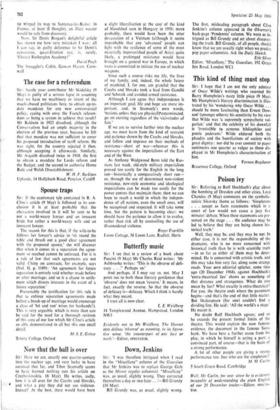Poison ivy
Sir: Referring to Rolf Hochhuth's play about the bombing of Dresden and other cities, Lord Chandos (9 May) comments on the symbolic- satiric Sikorsky theme as follows: 'Simpletons . . accept as facts statements which in a court of law would not cause a jury five minutes' debate. When these statements are pre- sented on the stage . . . the audience may be led to believe that they are being shown his- torical truth.'
Well, they, may be, and they may be not. In either case, it is not the responsibility of the dramatist, who, is no more concerned with historical truth than he is with scientific truth —in so far as either of them- may be deter- mined. He is concerned with artistic truth, and this may take him very far, along-some strange roads. Your •wn editorial splutter, some time ago (20 December 1968), against Hochhuth's 'extra-theatrical lies' shows us something of that distance and strangeness. What do you mean by lies? What exactly is extra-theatrical? For you, the theatre ends where the pavement begins—and that's the end of that little matter. But Shakespeare (for one) couldn't find a dividing line. He said : 'All the world's a stage.' He meant it.
No doubt Rolf Hochhuth agrees; and so he extends the present formal limits of the theatre. This would explain the now famous evidence, the document in the famous Swiss bank. We have here a further scene from his play, in which he himself is acting a part; a convinced part, of course—that is the basis of a strong performance. A lot of other people are giving a strong performance too. Just who are the simpletons? M. M. Carlin 5 South Green Road. Cambridge Well, Mr Carlin, for one: since he is evidently incapable of understanding the plain English of our 20 December leader.—Editor. SPECTA- TOR.






































 Previous page
Previous page